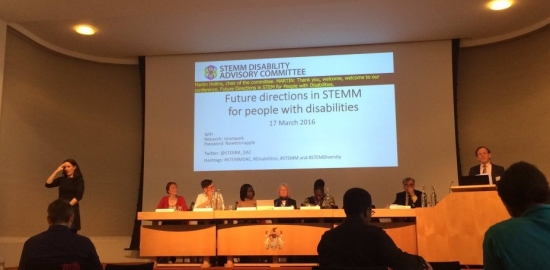By Gabriele Butkute, science policy assistant at the Royal Society of Biology
 I recently attended the Future directions in STEMM for people with disabilities conference, organised by the STEMM Disability Advisory Committee (STEMM-DAC) of which the RSB is a member. It taught me a great deal about disability support, compassion and resilience.
I recently attended the Future directions in STEMM for people with disabilities conference, organised by the STEMM Disability Advisory Committee (STEMM-DAC) of which the RSB is a member. It taught me a great deal about disability support, compassion and resilience.
Disability in the United Kingdom 2014: Facts and figures a report by the Papworth Trust, provides us with a lot of useful information to assess the scale of the issues surrounding disabilities in the country, and I find most of the findings worrying:
- “60% of disabled working-age adults are not in paid work compared to only 15% of their non-disabled counterparts.”
- “Disabled adults are nearly 3 times as likely to have no formal qualifications as non-disabled adults, 30% and 11% respectively
It is clear that the problems disabled people face while studying and in a workplace are huge and they deprive us of talent that people of all abilities and can bring.
Inclusion of people with disabilities in STEMM education and employment was the main topic of the conference, which raised issues regarding recruitment, induction, outreach and technical skills development.
My round-table group talked about the issues around induction at work and at universities. Attendees shared their views and experiences, and everybody knew something the others didn’t – highlighting the importance of knowledge sharing events like these.
Patterns can be set early. Sometimes children are discouraged from disclosing their disability until they get to university. A comment on this raised quite a few nods in the audience and whispers of “It happened to me too”.
When people do decide to disclose their disability, they will often find that forms are generic and many conditions are not included, or the forms are simply too difficult to understand. All of these things can create barriers and need to be taken into account when it comes to planning an induction.
Under-disclosure of disability is still very common, particularly for hidden/non-visible disabilities. It was mentioned several times throughout the day that assessment centres aren’t always fit for purpose to accommodate people with disability, as psychometric tests aren’t suitable for all, and there is a clear need for alternative assessments. “People with disabilities feel over assessed and under supported”, said one of the conference attendees. Disclosing mental health information is a particularly sensitive matter as people worry about confidentiality.
My round-table also touched on matters of disability training at work. Some organisations provide low level training for all and extra training for those that have a colleague(s) with disabilities in their teams. However, it was agreed that it is harder to do that for small companies due to lack of resources. Unconscious bias training came up at every group discussion as an essential part of any training.
It is important to look at people as individuals: people with joys and worries, family and caring commitments, hobbies and responsibilities. The goal is about improving diversity in STEMM overall, not just for people with disabilities. The Royal Society’s campaign #AndAScientist is a great example of this.
At universities, there are roles for personal tutors, Students’ Unions, disability support networks and fellow learners to play. Role models are yet another way to support and encourage everybody. It is crucial to keep battling ignorance and stigma that still surrounds disability.
Follow STEMM-DAC on Twitter and check out #STEMMDAC

